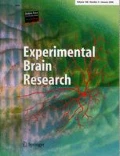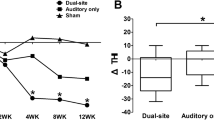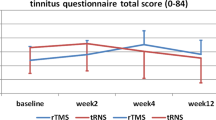Abstract
Based on its ability to reduce the excitability of the cortex locally, low-frequency repetitive transcranial magnetic stimulation (rTMS) has been investigated for the treatment of hyperexcitability disorders such as auditory hallucinations and tinnitus. Results are promising, but characterized by only moderate improvement and a high inter-individual variability. Experimental data from motor cortex stimulation in healthy subjects indicates that the depressant effect of low-frequency rTMS can be enhanced by high-frequency priming stimulation. Here we will investigate whether high-frequency priming also improves the therapeutic efficacy of low-frequency rTMS in a clinical application. 32 patients with chronic tinnitus were randomly assigned to either a standard protocol of low-frequency rTMS (110% motor threshold, 1 Hz, 2000 stimuli/day) or a stimulation protocol in which priming stimulation with 6 Hz (90% motor threshold, 960 stimuli) preceded low-frequency rTMS (110% motor threshold, 1 Hz, 1040 stimuli/day). Stimulation was applied over the left auditory cortex by using MRI-guided coil positioning. The treatment outcome was assessed with a standardized tinnitus questionnaire. There was no significant difference between the standard protocol and the protocol involving priming stimulation. Both stimulation protocols resulted in significant clinical improvement after 10 days of stimulation, as compared to baseline. Our data does not support an enhancing effect of higher frequency priming on low-frequency rTMS in the treatment of tinnitus.

Similar content being viewed by others
References
Brusa L, Versace V, Koch G, Iani C, Stanzione P, Bernardi G, Centonze D (2006) Low frequency rTMS of the SMA transiently ameliorates peak-dose LID in Parkinson’s disease. Clin Neurophysiol 117:1917–1921
Catafau AM, Perez V, Gironell A, Martin JC, Kulisevsky J, Estorch M, Carrio I, Alvarez E (2001) SPECT mapping of cerebral activity changes induced by repetitive transcranial magnetic stimulation in depressed patients. A pilot study. Psychiatry Res 106:151–160
Chen R, Classen J, Gerloff C, Celnik P, Wassermann EM, Hallett M, Cohen LG (1997) Depression of motor cortex excitability by low-frequency transcranial magnetic stimulation. Neurology 48:1398–1403
Christie BR, Abraham WC (1992) Priming of associative long-term depression in the dentate gyrus by theta frequency synaptic activity. Neuron 9:79–84
Daskalakis ZJ, Moller B, Christensen BK, Fitzgerald PB, Gunraj C, Chen R (2006) The effects of repetitive transcranial magnetic stimulation on cortical inhibition in healthy human subjects. Exp Brain Res 174:403–412
Eichhammer P, Langguth B, Marienhagen J, Kleinjung T, Hajak G (2003) Neuronavigated repetitive transcranial magnetic stimulation in patients with tinnitus: a short case series. Biol Psychiatry 54:862–865
Franca M, Koch G, Mochizuki H, Huang YZ, Rothwell JC (2006) Effects of theta burst stimulation protocols on phosphene threshold. Clin Neurophysiol 117:1808–1813
George MS, Belmaker RH (2000) Transcranial magnetic stimulation in neuropsychiatry. American Psychiatric Press, Washington, DC
Gershon AA, Dannon PN, Grunhaus L (2003) Transcranial magnetic stimulation in the treatment of depression. Am J Psychiatry 160:835–845
Goebel G, Hiller W (1994) The tinnitus questionnaire. A standard instrument for grading the degree of tinnitus. Results of a multicenter study with the tinnitus questionnaire. HNO 42:166–172
Hallam RS, Jakes SC, Hinchcliffe R (1988) Cognitive variables in tinnitus annoyance. Br J Clin Psychol 27(Pt 3):213–222
Hoffman RE, Hawkins KA, Gueorguieva R, Boutros NN, Rachid F, Carroll K, Krystal JH (2003) Transcranial magnetic stimulation of left temporoparietal cortex and medication-resistant auditory hallucinations. Arch Gen Psychiatry 60:49–56
Hoffman RE, Gueorguieva R, Hawkins KA, Varanko M, Boutros NN, Wu YT, Carroll K, Krystal JH (2005) Temporoparietal transcranial magnetic stimulation for auditory hallucinations: safety, efficacy and moderators in a fifty patient sample. Biol Psychiatry 58:97–104
Huang YY, Colino A, Selig DK, Malenka RC (1992) The influence of prior synaptic activity on the induction of long-term potentiation. Science 255:730–733
Iyer MB, Schleper N, Wassermann EM (2003) Priming stimulation enhances the depressant effect of low-frequency repetitive transcranial magnetic stimulation. J Neurosci 23:10867–10872
Khedr EM, Rothwell JC, Ahmed MA, El-Atar A (in press) Effect of daily repetitive transcranial magnetic stimulation for treatment of tinnitus: comparison of different stimulus frequencies, J Neurol Neurosurg Psychiatry
Kirkwood A, Rioult MC, Bear MF (1996) Experience-dependent modification of synaptic plasticity in visual cortex. Nature 381:526–528
Kleinjung T, Eichhammer P, Langguth B, Jacob P, Marienhagen J, Hajak G, Wolf SR, Strutz J (2005) Long-term effects of repetitive transcranial magnetic stimulation (rTMS) in patients with chronic tinnitus. Otolaryngol Head Neck Surg 132:566–569
Kleinjung T, Steffens T, Sand P, Murthum T, Hajak G, Strutz J, Langguth B, Eichhammer P (2007) Which tinnitus patients benefit from transcranial magnetic stimulation? Otolaryngol Head Neck Surg 137:589–595
Lang N, Siebner HR, Ernst D, Nitsche MA, Paulus W, Lemon RN, Rothwell JC (2004) Preconditioning with transcranial direct current stimulation sensitizes the motor cortex to rapid-rate transcranial magnetic stimulation and controls the direction of after-effects. Biol Psychiatry 56:634–639
Langguth B, Eichhammer P, Kreutzer A, Maenner P, Marienhagen J, Kleinjung T, Hajak G (2006a) The impact of auditory cortex activity on characterizing and treating patients with chronic tinnitus—first results from a PET study. Acta Otolaryngol Suppl 556:84–88
Langguth B, Zowe M, Landgrebe M, Sand P, Kleinjung T, Binder H, Hajak G, Eichhammer P (2006b) Transcranial magnetic stimulation for the treatment of tinnitus: a new coil positioning method and first results. Brain Topogr 18:241–247
Plewnia C, Reimold M, Najib A, Brehm B, Reischl G, Plontke SK, Gerloff C (2007a) Dose-dependent attenuation of auditory phantom perception (tinnitus) by PET-guided repetitive transcranial magnetic stimulation. Hum Brain Mapp 28:238–246
Plewnia C, Reimold M, Najib A, Reischl G, Plontke SK, Gerloff C (2007b) Moderate therapeutic efficacy of positron emission tomography-navigated repetitive transcranial magnetic stimulation for chronic tinnitus: a randomised, controlled pilot study. J Neurol Neurosurg Psychiatry 78:152–156
Poulet E, Brunelin J, Bediou B, Bation R, Forgeard L, Dalery J, d’Amato T, Saoud M (2005) Slow transcranial magnetic stimulation can rapidly reduce resistant auditory hallucinations in schizophrenia. Biol Psychiatry 57:188–191
Ridding MC, Rothwell JC (2007) Is there a future for therapeutic use of transcranial magnetic stimulation? Nat Rev Neurosci 8:559–567
Rossi S, De CA, Ulivelli M, Bartalini S, Falzarano V, Filippone G, Passero S (2007) Effects of repetitive transcranial magnetic stimulation on chronic tinnitus. A randomised, cross over, double blind, placebo-controlled study. J Neurol Neurosurg Psychiatry 78:857–863
Rossini PM, Barker AT, Berardelli A, Caramia MD, Caruso G, Cracco RQ, Dimitrijevic MR, Hallett M, Katayama Y, Lucking CH (1994) Non-invasive electrical and magnetic stimulation of the brain, spinal cord and roots: basic principles and procedures for routine clinical application. Report of an IFCN committee. Electroencephalogr Clin Neurophysiol 91:79–92
Siebner HR, Filipovic SR, Rowe JB, Cordivari C, Gerschlager W, Rothwell JC, Frackowiak RS, Bhatia KP (2003) Patients with focal arm dystonia have increased sensitivity to slow-frequency repetitive TMS of the dorsal premotor cortex. Brain 126:2710–2725
Siebner HR, Lang N, Rizzo V, Nitsche MA, Paulus W, Lemon RN, Rothwell JC (2004) Preconditioning of low-frequency repetitive transcranial magnetic stimulation with transcranial direct current stimulation: evidence for homeostatic plasticity in the human motor cortex. J Neurosci 24:3379–3385
Smith JA, Mennemeier M, Bartel T, Chelette KC, Kimbrell T, Triggs W, Dornhoffer JL (2007) Repetitive transcranial magnetic stimulation for tinnitus: a pilot study. Laryngoscope 117:529–534
Speer AM, Kimbrell TA, Wassermann EM, J DR, Willis MW, Herscovitch P, Post RM (2000) Opposite effects of high and low frequency rTMS on regional brain activity in depressed patients. Biol Psychiatry 48:1133–1141
Speer AM, Willis MW, Herscovitch P, Daube-Witherspoon M, Shelton JR, Benson BE, Post RM, Wassermann EM (2003a) Intensity-dependent regional cerebral blood flow during 1-Hz repetitive transcranial magnetic stimulation (rTMS) in healthy volunteers studied with H215O positron emission tomography: I. Effects of primary motor cortex rTMS. Biol Psychiatry 54:818–825
Speer AM, Willis MW, Herscovitch P, Daube-Witherspoon M, Shelton JR, Benson BE, Post RM, Wassermann EM (2003b) Intensity-dependent regional cerebral blood flow during 1-Hz repetitive transcranial magnetic stimulation (rTMS) in healthy volunteers studied with H215O positron emission tomography: II. Effects of prefrontal cortex rTMS. Biol Psychiatry 54:826–832
Wang H, Wagner JJ (1999) Priming-induced shift in synaptic plasticity in the rat hippocampus. J Neurophysiol 82:2024–2028
Acknowledgements
We would like to thank Helene Niebling and Sandra Pfluegl for technical assistance with TMS administration. The study was supported by the Tinnitus Research Initiative.
Author information
Authors and Affiliations
Corresponding author
Additional information
Clinical trial registration: Priming stimulation as an enhancement of low-frequency repetitive Transcranial Magnetic Stimulation (rTMS) for the treatment of tinnitus - http://www.controlled-trials.com/ISRCTN03638520 - ISRCTN03638520.
Rights and permissions
About this article
Cite this article
Langguth, B., Kleinjung, T., Frank, E. et al. High-frequency priming stimulation does not enhance the effect of low-frequency rTMS in the treatment of tinnitus. Exp Brain Res 184, 587–591 (2008). https://doi.org/10.1007/s00221-007-1228-1
Received:
Accepted:
Published:
Issue Date:
DOI: https://doi.org/10.1007/s00221-007-1228-1




